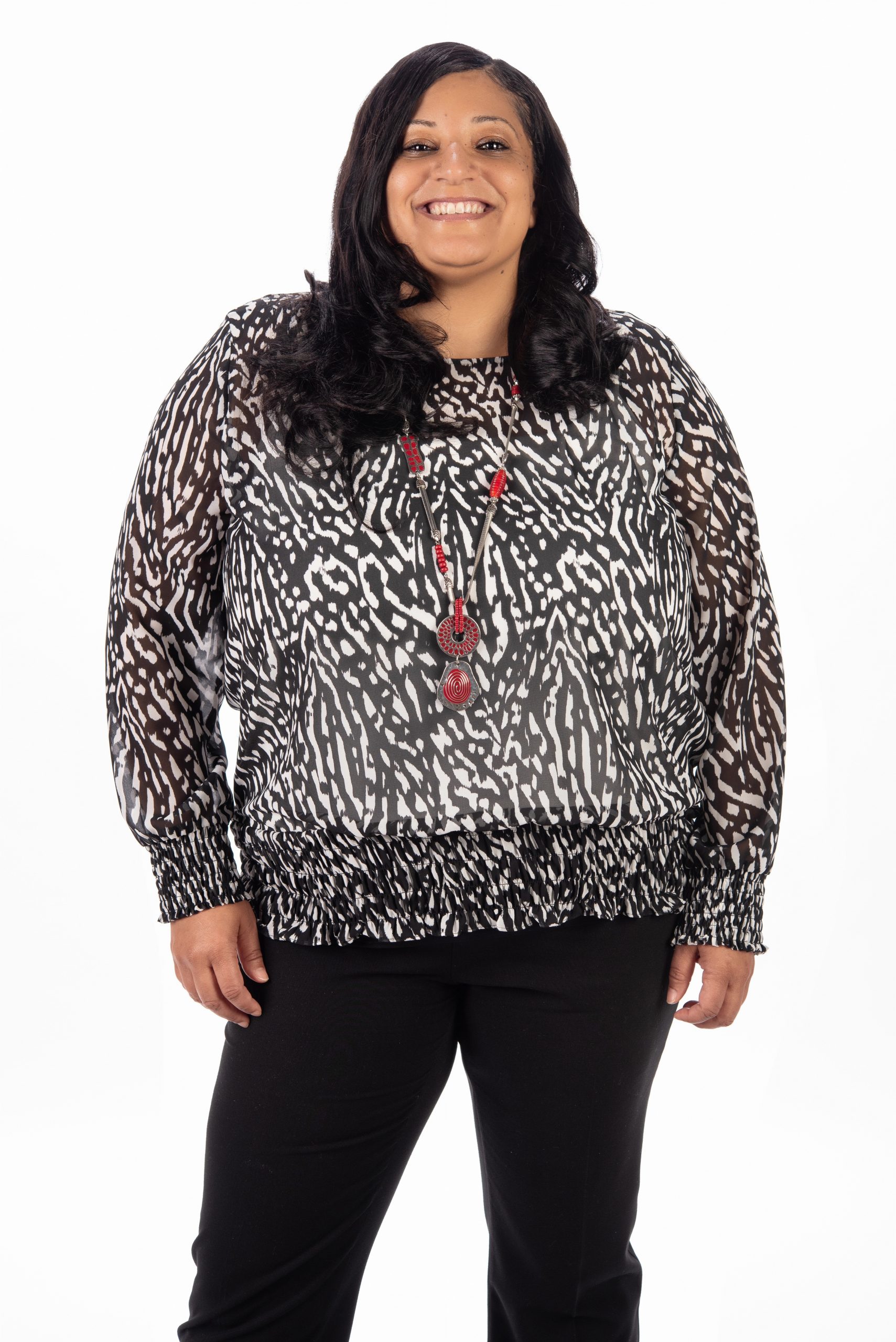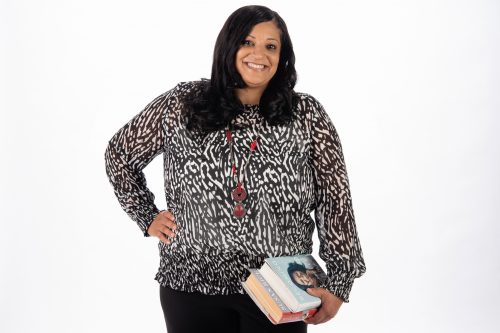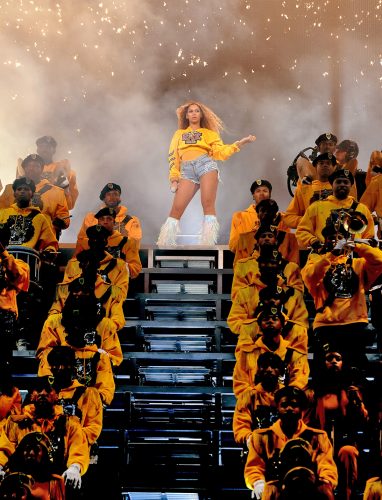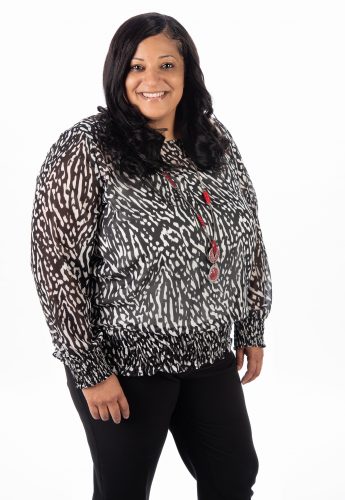From Beyonce to George Floyd: A Q&A with Lynn Hampton
The sociologist brings race, feminism and social justice to the forefront of her classrooms.

Photo by Glen E. Ellman
From Beyonce to George Floyd: A Q&A with Lynn Hampton
The sociologist brings race, feminism and social justice to the forefront of her classrooms.
The assistant professor of professional practice in the John V. Roach Honors College focuses her research on educational inequalities in the United States. She has designed and taught classes including Cultural Contact Zones: U.S. Teaching and American Society, Engaging Difference in Diversity, and Beyoncé and Intersectionality.
What initially sparked your interest in teaching about intersectionality and justice?
I grew up in an inner-city, urban environment in Los Angeles. So at a very early age I was exposed to a lot of diversity. I’m grateful for that experience because not having formulated a career goal — obviously — early on, I was already being prepared for a role as a sociologist without even really knowing it.
And then from there, when I graduated from high school, I attended Wellesley College in Massachusetts. It’s a small liberal arts college for women. But that was also a very transformative experience. At that stage, I didn’t really formulate, “Oh, I’m going to be a college professor,” or “I want to go get a PhD.” But I was still introduced to role models and mentors because they were abundant on campus. They occupied positions of leadership and power, but they were also very willing to develop that in younger women.

Lynn Hampton, assistant professor of professional practice in the John V. Roach Honors College, teaches classes on engaging difference and diversity. Photo by Glen E. Ellman
I think that most young people, when they have a desire and a passion for social justice and social change, they tend to think of that in a very one-dimensional way — like it has to happen through law, and it has to happen through politics. And I was that person, saying, “Oh, I have to go to law school because that’s the only way I can make an impact in society.” And that was my naivete because I just wasn’t aware that there were other options I could pursue.
Thankfully I transitioned quickly. I started out in law but then quickly changed to a program in sociology. And that’s when it all came together: “OK, yes, I can be an agent for change. I can advocate for social justice, racial justice, equity. I can do that through scholarship. I can do that through teaching. I can do that through mentoring. I can do that through developing students.”
I then attended Vanderbilt University to pursue a PhD in sociology, and while it was a very conservative campus, and a very conservative community, I still was trained with the skills and the tools sociologically to be able to do what I wanted to do. When I graduated, I started a career in higher education. Intersectionality just kind of came together through a combination of lots of courses I’ve taught and conversations I’ve had with students.
You tell students that your classroom is a brave space where they can feel comfortable sharing experiences and opinions and discussing how they can make an impact in society. What does it mean for a college student to be socially responsible?
Ideally, the thing that I try to encourage is a level of agency that sometimes gets downplayed. Today’s younger people sometimes get minimized. Older people might think, “They make noise on social media, but they don’t translate that to concrete action or sustained action.” That’s an unfair criticism. I remember Gen Z’s taking action when they couldn’t vote in any major election — like after school shootings. Young people were literally walking out of their classrooms as statements and forms of protest.
They couldn’t elect these officials to do better by them, but they were like, “Hey, this directly affects us. They’re coming into our schools and shooting, so this makes us incredibly vulnerable. And we do have a dog in this fight. We do have skin in this game.”
I try to approach every topic I teach from that perspective. You do have a dog in this fight; you do have skin in this game.
That can look different for every student. Maybe their form of agency or activism is being engaged in a campaign or contributing to a campaign. Or volunteering at a nonprofit. I just want young people to do something with the knowledge that they gain.
How do you think events such as the protests following George Floyd’s death will impact what you teach in the classroom?
“We’re in simultaneously a global pandemic and almost like a racial pandemic at the same time.”
Lynn Hampton
We’re in simultaneously a global pandemic and almost like a racial pandemic at the same time. Those two are major issues that are going to affect us as a society moving forward, and they’re going to affect the future of higher education moving forward. But I think we’re in a really opportune time in our history and in this country when it comes to really getting some understanding of how to engage in social change for our society.
I’m really encouraged by the level of activism that I see being demonstrated through students, through college-age people and younger. But at the same time, one of the things that I’m focusing on too is how can we as faculty continue to nurture that in a way that’s positive, that continues that momentum. Because sometimes we tend to get caught up in a moment, whatever that moment is. And then after that moment passes, we’re back to our life as normal. And so I want to try to encourage young people to continue in that momentum.
What are some of the biggest challenges in education you foresee in the midst of the coronavirus pandemic?
“I’m really encouraged by the level of activism that I see being demonstrated through students, through college-age people and younger.”
Lynn Hampton
All these pandemics are going to impact our schools, both K-12 schools and higher education institutions, and they’re going to force us to do things differently in a variety of ways. So one of the things I’m trying to ascertain is how students are processing this moment. I think the challenge is that we are wired for connectivity. We have to step away from that for social distancing, because obviously that is necessary to stop the spread. How do we still maintain that level of connection, interaction, empathy and compassion for one another, which you usually get in that face-to-face interaction? This is going to be our challenge because moving forward, this may be the new normal, right? I hope that’s not the case for an extended period of time, but it’s possible that it might be. We still have to maintain some level of autonomy and be able to empathize and understand where our fellow person is coming from. As an educator, I need to facilitate that connection in my classroom — or via Zoom — but also have students think about how they’re going to do that.
One of the goals of the Cultural Contact Zones: U.S. Teaching in American Society course is to dispel myths about the role of education and schools in modern society. What are some of these myths and why is important for students to learn a new perspective?
One of the myths is the myth of meritocracy. That’s always a challenging one, particularly for Honors college students, because they’re like, “Well, I’m here because I’ve been such a great student. I’ve done all the work, and I followed all the rules and checked all the boxes.”
And I say, “That might be true, but guess what? There may be other great students who didn’t have the advantage of being in Honors-level courses when they were in K through 12.”
With talented-and-gifted programs, who gets placed in those Advanced Placement tracks? Where you’re zoned by your ZIP code can also determine a whole host of resources that you get access to. Not getting that access can be deal-breakers for some students in terms of the best courses and access to higher education experiences like those at TCU.
Another big one is the idea that we live in a colorblind society. That myth has been dispelled. We have to deconstruct that so people can see how policies get implemented within K through 12 schools. While people may be colorblind, the impact isn’t colorblind, in terms of how it manifests along socioeconomic lines and race, which is intertwined with socioeconomic status, gender, etc.
For many years you have taught the Honors Colloquia course Beyoncé and Intersectionality. How do themes in Beyoncé’s music touch upon issues of race, class and gender, and how do these disparities have implications for society as a whole?

Lynn Hampton’s course Beyonce and Intersectionality is a popular class at TCU, often with a wait list. Courtesy of Getty Images © Larry Busacca / Staff
I like using Beyoncé as sort of the cultural iconic symbol to essentially challenge all those paradigms, because obviously she’s African American and she’s female. So she’s at the intersection of both, but she’s literally at the top of her game as it relates to the female representation of empowerment in the music industry. She owns her brand and every part of that brand. We talk about that, and we dig deeper looking at a lot of her videos, like “Formation” and “Lemonade.” The whole Lemonade album gets at a lot of these issues of inequality and intersectionality. She talks about things related to racial and social justice and police brutality.
So I kind of use her music as the backdrop to set the scenario, but then students dig deeper because they have to lead their own conversations and discussions around those themes. They have to unpack the video, they have to unpack the lyrics, but they’re engaging their peers at the same time. They also have readings that provide foundations by intersectional scholars like Kimberle Crenshaw, Audrey Lorde, bell hooks and Patricia Hill Collins.
What can people learn about activism and the long tradition of resistance through Beyoncé’s music?
Last spring in the Beyoncé colloquia we were having a conversation about activism, and I really loved the way the discussion leaders were framing it because they were talking about a commitment to social justice. The discussion about how best to make a change in society was framed in the context of one of the scholars that we were reading about, and the students were kind of asking, what does a commitment to social justice look like?
And then we started talking about activism in the context of Beyoncé. We don’t, by any means, think that she’s not subject to critique just because she’s a focal point of the course. Everything is subject to critique, including the scholars we read. What are their limitations? Where are their blind spots? What are some critiques that you have?
I’ll be the first to admit that I wasn’t a huge fan of Beyoncé initially, because I was not very aware of her music, and I perceived one thing based on what I saw. But then as I began to study more, I was like, “Wow, there’s layers to this.” And she continues to evolve and has continued to evolve over the course of her career. I would hope that she would be a model for all of us. We’re constantly evolving. As human beings, we’re works in progress.
In scholarly literature, they’re even moving away from the idea of cultural competency because the assumption is that you arrive at this point and you’re like, “I got it. I’m woke.” But no. We need cultural humility. It’s an ongoing process. You’re constantly learning, unlearning and relearning. And when you know more, you do better.
So I think Beyoncé is representative of that, which I tell students. She’s constantly evolving. I’ve seen her evolve over the course of the time I’ve been teaching the class. Her lyrics are evolving, and so is her understanding of her platform and her influence. And so similarly, I tell students that to me, that’s what a commitment to social justice looks like: When you know more, you do more, you do better. At the end of the day, she keeps doing what’s important, just keeps showing up.
How do you foster a brave space within the learning environment?
When you try to facilitate conversations about hot topics of social justice — that includes issues about oppression and privilege and power — inevitably there are going to be issues and topics that are going to make people feel a variety of ways. Sometimes people are going to feel vulnerable. Sometimes people are going to feel a little apprehensive. Sometimes people may feel trepidation. Or they may feel exposed if they say something in reference to an aspect of their social identity that they think could cause them to be criticized.
“A brave space throws safety out the window. It embraces vulnerability.”
Lynn Hampton
A brave space throws safety out the window. It embraces vulnerability, and what I tell my students all the time — and hopefully I’m living up to it — I’m never going to ask you to do anything that I’m not willing to model myself. So I will model transparency. I will model vulnerability, and I will model authenticity.
You said that one of your goals of the course Engaging Difference in Diversity is for students to gain a sense of empathy for the global community. What does empathy look like in this sense?
I’d gone into the Cornell Institute for faculty diversity training the summer before I taught the course. I was grateful for that experience because it did give me some tools for pedagogical training and class facilitation.
TCU is not unique in this, but we do have a very homogenous undergraduate population in terms of race, ethnicity and socioeconomic status. We have students who have pretty much grown up with people who’ve only looked like them. For some of them, this is their very first time coming into spaces and settings with people who have different lived experiences racially, culturally, socioeconomically, and who come from different countries.
What we know from sociology is that it’s not uncommon for people to tend to gravitate toward people who are like them. Not that they don’t like people who are not like them, but this is just the common tendency, the human nature tendency is to gravitate toward like. So then the homogeny gets reproduced in our environments — and that’s what we see at TCU in the Greek life organizations, etc. When I do have a classroom, I have an opportunity because that is the only space that I can control at TCU. I cannot control what happens in those dorms. I cannot control what happens in the organizations. It’s one thing to read something in the text. If a student is reading about oppression or privilege or the dynamics of power and inequality they may intellectually get it. But then if they’re sitting next to someone in a classroom, who is talking about their lived experiences and how they have experienced marginality, how they’ve experienced oppression, how they’ve experienced subordination, that brings it to a different level of understanding. It makes it personal. And it does I think engender a certain different kind of empathy than it would if you just read something in an article.
For years you have tried to get Beyoncé to visit as a guest speaker during the Honors Colloquia. Any progress? What would it mean to you to have her in class? What do you think she would talk about?

Lynn Hampton said she’s optimistic that Beyonce could visit as a guest speaker during the Honors Colloquia. Photo by Glen E. Ellman
I’m still working on it, and I’m really optimistic. Beyoncé has been very outspoken on her Instagram and social media lately, particularly with the George Floyd situation, and she’s been generating a lot of awareness around how we need to be more sensitive and mindful to the issues related to Black Lives Matter. I believe that this is an opportune time because we have been highlighting things that she’s been doing throughout the course of teaching this class. I developed a Twitter page for the Beyoncé class. Apparently that’s what it takes, right? Because that’s how people are communicating and connecting and knowing what’s going on. And so, I keep telling students to tweet and post. And so that’s the game plan. There is a method to the madness right? To essentially come across somebody’s radar that’s either in her inner circle or working very closely with.
What do you hope students take away from your classes?
The last time I taught the Engaging Difference in Diversity class was in 2017. But students are still saying how that was a transformative class for them, one of the most transformative classes they have taken at TCU. What I like about the class was that it drew students from all different disciplines.
Because I was doing some research on the issue of the commitment to social justice — and what does that look like for a college student — I was demographically keeping data on who’s enrolling: majors, departments, colleges, that type of thing. And I was keeping information on race, ethnicity, etc. The highest representation in terms of college, believe it or not, was Science & Engineering. Some of the students were pre-med and thinking about going into medicine. And they’re like, “This has probably helped me think about being a more clinically competent healthcare professional in terms of how I engage with diverse populations.”
I also had a student who was pursuing a PhD in counseling, and they wanted to work with children of trauma. They were saying the same thing. I want any student to take that information, — whether they’re going into criminal justice, politics, education, health — I want them to think about how they can use these tools of intercultural communication and cultural awareness. I want them to have an even greater level of awareness about issues of power, privilege and oppression and how that functions in our society and how that impacts people on a day-to-day basis. So walking away with that makes them more confident, competent individuals, in whatever fields or professions they decide to pursue.
What steps could students and the university take to create more inclusive and culturally engaging community?
“From what I’m hearing from students: sometimes they’re tired of talking. They can’t say anything that they haven’t already said. They want to see some concrete and sustained action.”
Lynn Hampton
From what I’m hearing from students: sometimes they’re tired of talking. They can’t say anything that they haven’t already said. They want to see some concrete and sustained action.
So it can’t just be dialogue. Talk has to be backed up with some concrete action as it relates to the racial inequalities that are being discussed. As a university, we need to really be mindful of moving into a phase of actual action and not just dialogue. We’ve had open forums, we’ve had discussions, we’ve had listening sessions — and I’m not saying that those things weren’t legitimate — but at this time I know many students, particularly from marginalized demographic backgrounds, are exhausted from talking. Put those actions into words. Put your money where your mouth is. No more platitudes.
What are we going to do to move forward? I don’t think we need to have any more conversations about what we need to do. I think all of that has been already talked about and discussed, too, for some people ad nauseam. So let’s move forward. How are we going to move forward and what does that look like? In those discussions we need to make sure that all groups of people are equally valued in that process. We need to have all of our stakeholders in that conversation, not just people at the top, but everybody.
What advice do you have for people advocating for racial equality? What is the best way to learn and inform others?
It’s a marathon, not a sprint. If we’re trying to sprint, we’re going to burn out. My advice would be to pace yourself.
Social change does not happen overnight. It’s a process. We’re definitely on that journey and making that progress, but I don’t want students to burn out. I don’t want them to get frustrated and disillusioned. Because it never happens like that. I didn’t understand it when I was younger because I wanted everything to just be fixed, but I know that’s not realistic. I have wisdom on my side now. I have age on my side, experience on my side. But keep up the momentum. Keep up the energy. Keep holding people’s feet to the fire. Keep holding people accountable. Keep doing all the things, but pace yourselves.
Editor’s Note: The questions and answers have been edited for length and clarity.

Your comments are welcome
3 Comments
I’ve been an educator for all my life. I’m so encouraged by what Dr. Hampton espouses. We made our sons leave our hometown of El Paso to get a different experience. I wish you had been there when they were students. I would love to sit in on one of your classes or discussions. My passion is and always has been to find a way for every child to be valued and be offered the opportunity to find their own voice. Congratulations Dr. Hampton, you are doing the work that will make this happen.
Thank you for these kind words Laurie. I know you did an amazing job with your sons. It takes a village!
I am grateful to be able to “stand in the gap” for our students. Blessings to you!
As a student of Dr. Hampton’s I am so glad to see her passion celebrated in this article! She is even more amazing in person.
Related reading:
Web Extras
Podcast: Beyonce, Intersectionality and Lynn Hampton
What is intersectionality? How does Beyonce represent it? What is feminism?
Campus News: Alma Matters
Show Your Syllabus: Beyonce and Intersectionality
From “Formation” to “Lemonade,” this course utilizes the artistry, musicianship and feminism of Beyoncé to explore deeper issues of patriarchy, racism, classism and sexism in society.
Features
Katherine Spillar Fights for Feminism
Activist helps lead the charge for gender equality.